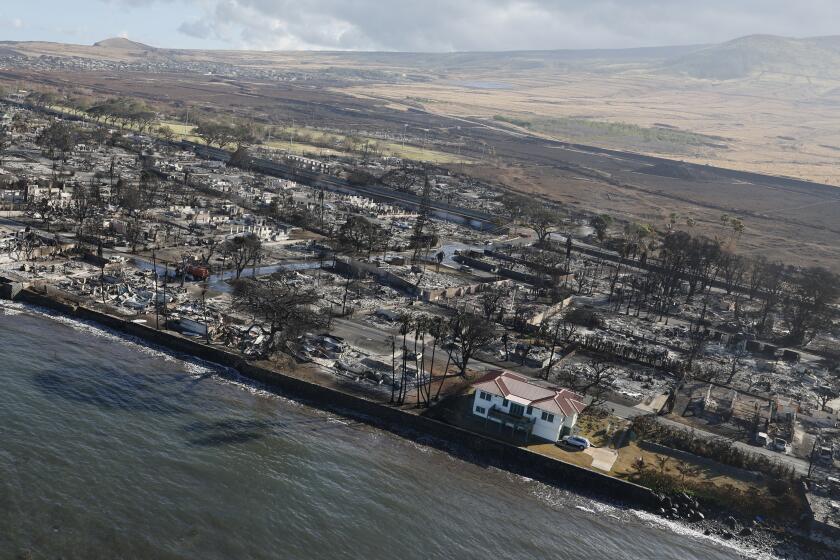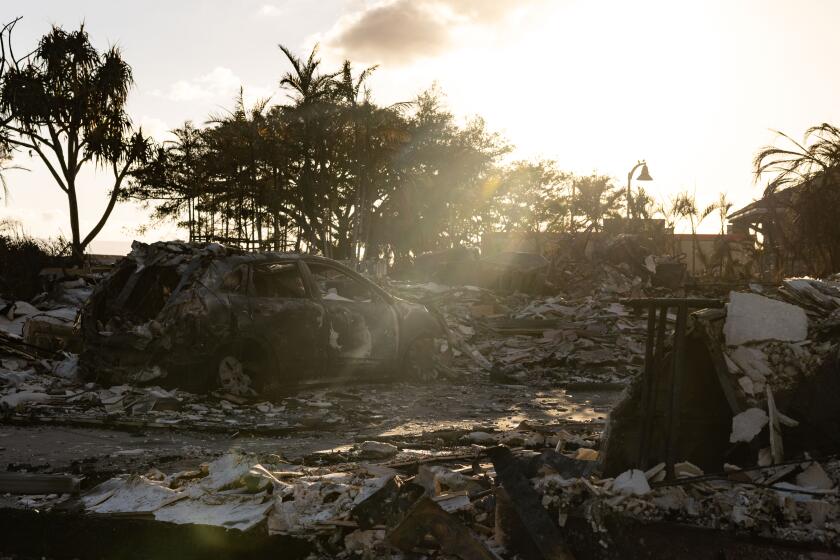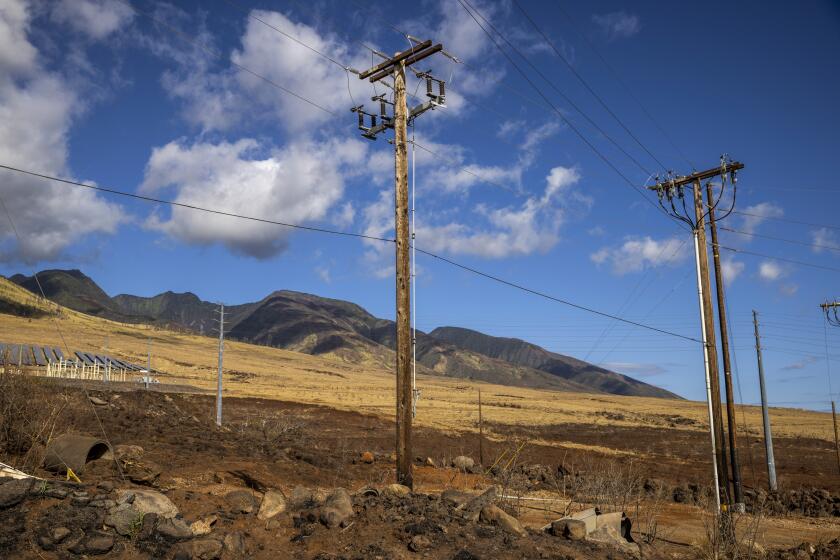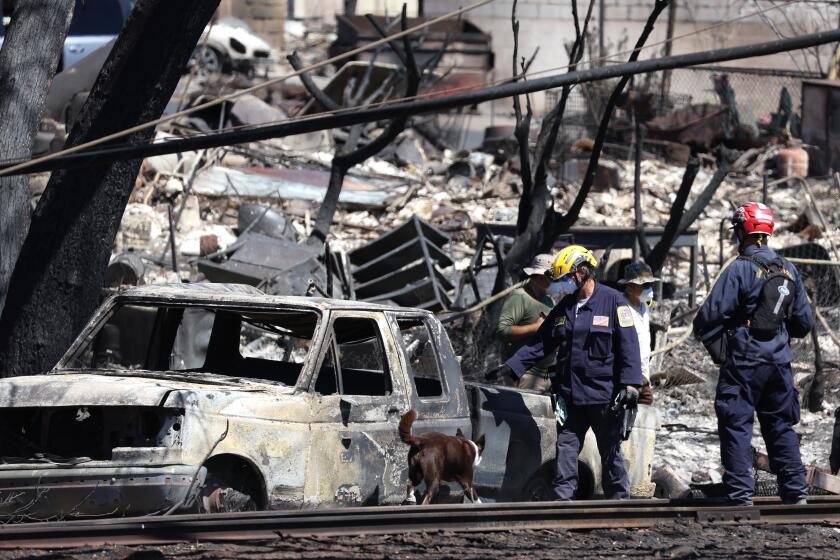In Hawaii, Lahaina residents brace for what they’ll find as they return home: ‘I’m kind of afraid’
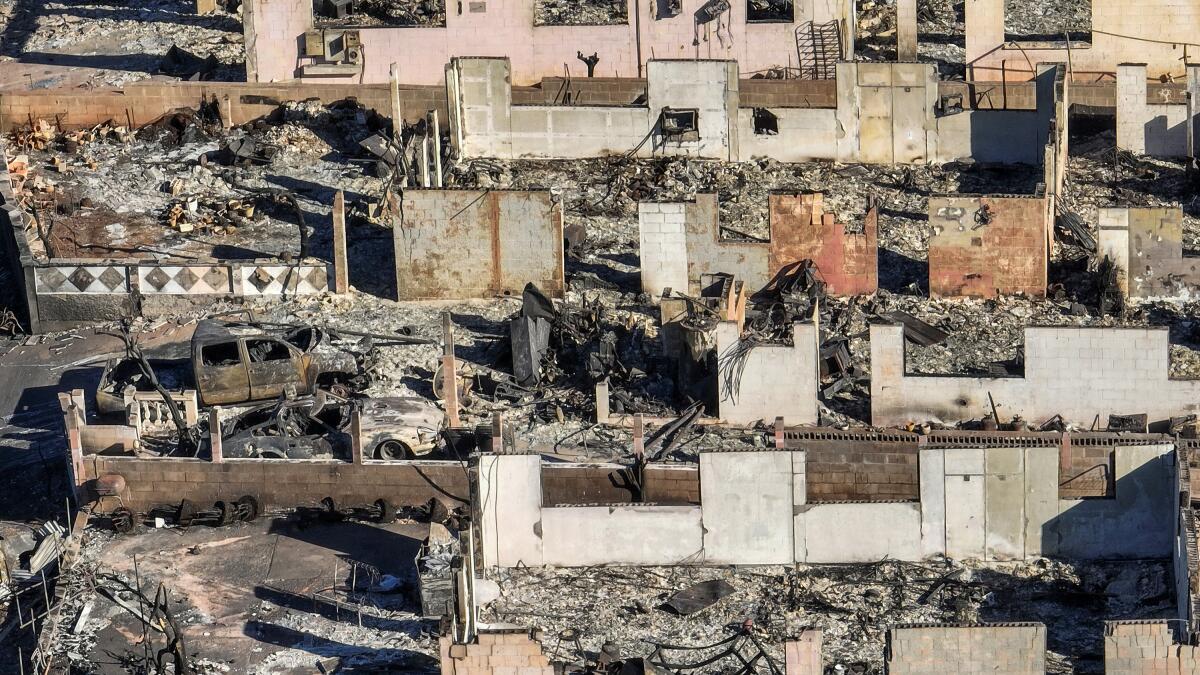
- Share via
HONOLULU — Soon after one of Maui’s Japanese Buddhist temples, the Lahaina Hongwanji Mission, burned in the deadliest U.S. wildfire in more than a century, its resident minister was desperate to go back and see what remained.
Six weeks later, he’s more hesitant.
“Now I feel like I have to have mental preparation to go there,” the Rev. Ai Hironaka said. “I’m kind of afraid.”
Hironaka and other Lahaina residents are grappling with a range of emotions as Maui authorities plan next week to begin allowing some to make supervised visits back into the areas devastated by the Aug. 8 fire, which killed at least 97 people and demolished thousands of buildings.
Lana Vierra is bracing to see the ruins of the home where she raised five children, a house that started with three bedrooms in 1991 and was expanded to six to accommodate her extended family as the cost of living in Hawaii soared.
She’s been telling her family to be ready when it’s their turn, so that they can all visit together.
A red-roofed house appears untouched amid the devastation of the Lahaina fire. Its owner says recent renovations may have helped make it fireproof.
“We’re preparing our minds for that,” she said. “I don’t know if our hearts are prepared for that.”
Authorities have divided the burned area into 17 zones and dozens of sub-zones. Residents or property owners of the first area to be cleared for reentry — known as Zone 1C, along Kaniau Road in the north part of Lahaina — will be allowed to return Monday and Tuesday on supervised visits.
Government agencies, including the U.S. Environmental Protection Agency, the U.S. Army Corps of Engineers and Maui County’s highways division, are involved in clearing the zones for reentry by, among other things, removing any hazardous materials, checking buildings for structural safety and ensuring safe road access.
Those returning will be provided water, shade, washing stations, portable toilets, medical and mental health care, and transportation if needed, said Darryl Oliveira, interim administrator of the Maui Emergency Management Agency.
Based on a Times review of Maui records, government officials should have been aware of the fire danger Lahaina faced.
Authorities are also offering personal protective equipment, including respirator masks and coveralls. Officials have warned that ash could contain asbestos, lead, arsenic or other toxins. There are other hazards, too, Oliveira said, such as burned-out cars along roads and chunks of metal or concrete in the ruins.
“We really want to help guide them, provide them the support, but also provide them the privacy, that space and quiet, so they can get the closure they’re looking for,” Oliveira said.
Some people might want to sift through the ashes for any belongings or mementos that survived, but officials are urging them not to for fear of stirring up toxic dust that could endanger them or their neighbors downwind. Other residents said they didn’t have immediate plans to return to the properties because jobs or the hassle of obtaining a pass to reenter the burn zone would keep them away.
Melody Lukela-Singh plans to take a hazardous-materials course before visiting the Front Street property where the house she lived in with about a dozen relatives once stood.
When high winds on Maui brought down power poles, the electrical wires were bare, uninsulated metal that could spark on contact with the dry grass below.
“I’m hoping to learn what we’re going to encounter as far as exposure to things we know nothing about,” she said. “The winds pick up and it’s going to be all in the air. It’s going be a while before all of that is gone.”
Hironaka reflected on how his feelings toward reentry have changed as the weeks have passed — and as the magnitude of losing the temple, along with his home on the temple grounds, has set in.
“After a week, I feel like I still have energy, like a car with full tank of gas,” he said. “After I use all the gasoline, I don’t know where to fill it up, what to fill it up. No gas. I feel like I’m pushing the empty-gas car only by myself.”
He, his wife, their four children and their French bulldog piled into his Honda Civic to escape the flames. As they drove off, he said, he imagined the temple as protecting their home.
Start your day right
Sign up for Essential California for the L.A. Times biggest news, features and recommendations in your inbox six days a week.
You may occasionally receive promotional content from the Los Angeles Times.
In a phone interview, he said he initially intended not to cry until he could return to thank the temple and apologize to the Buddha statue that had been at its main altar. But he became emotional and sobbed as he spoke, saying, “The temple building — I was supposed to protect [it] as resident minister.”
He has found solace, he said, in Buddhism’s teachings of wisdom and compassion, that Buddha has no judgment and allows him to feel whatever he feels in the moment.
Hironaka said he often sees a photo taken by the Maui News that shows the temple burning alongside Waiola Church next door. He considered the temple, built in 1933, to be like a family member, he said.
“That’s the end-of-life picture to me,” he said.
California’s bone hunters, forensic experts who are veterans of disaster, sift through Maui’s burn fields for the missing dead. ‘We owe it to the families.’
Lahaina’s two other Japanese Buddhist temples also burned down.
Jarom Ayoso is eager to get back to the property where he and his wife rented a house for nearly 15 years. His son was able to get in the day after the fire and took video of the destruction.
“I want closure for my end,” he said. “The only way I’m going get that is if I go and see it.”
Ayoso wants to see what’s left of the vehicles he rebuilt, including his 1986 GMC Sierra pickup truck. There were also motors he built on the property, including one that cost more than $13,000. He was just about to install it, he said, and “poof — gone.”
More to Read
Sign up for Essential California
The most important California stories and recommendations in your inbox every morning.
You may occasionally receive promotional content from the Los Angeles Times.
